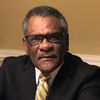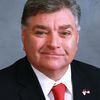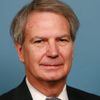North Carolina's 3rd Congressional District election, 2022
2024 →
← 2020
|
| North Carolina's 3rd Congressional District |
|---|
| Democratic primary Republican primary General election |
| Election details |
| Filing deadline: March 4, 2022 |
| Primary: May 17, 2022 Primary runoff: July 5, 2022 General: November 8, 2022 |
| How to vote |
| Poll times: 6:30 a.m. to 7:30 p.m. Voting in North Carolina |
| Race ratings |
Cook Political Report: Solid Republican Inside Elections: Solid Republican Sabato's Crystal Ball: Safe Republican |
| Ballotpedia analysis |
| U.S. Senate battlegrounds U.S. House battlegrounds Federal and state primary competitiveness Ballotpedia's Election Analysis Hub, 2022 |
| See also |
U.S. Senate • 1st • 2nd • 3rd • 4th • 5th • 6th • 7th • 8th • 9th • 10th • 11th • 12th • 13th • 14th North Carolina elections, 2022 U.S. Congress elections, 2022 U.S. Senate elections, 2022 U.S. House elections, 2022 |
All U.S. House districts, including the 3rd Congressional District of North Carolina, held elections in 2022. The general election was on November 8, 2022. The primary was scheduled for May 17, 2022. A primary runoff was scheduled to be held on July 5, 2022. The filing deadline was March 4, 2022.
For more information about the primaries in this election, click on the links below:
- North Carolina's 3rd Congressional District election, 2022 (May 17 Democratic primary)
- North Carolina's 3rd Congressional District election, 2022 (May 17 Republican primary)
Candidates and election results
General election
General election for U.S. House North Carolina District 3
Incumbent Gregory Murphy defeated Barbara Gaskins in the general election for U.S. House North Carolina District 3 on November 8, 2022.
Candidate | % | Votes | ||
| ✔ |  | Gregory Murphy (R) | 66.9 | 166,520 |
 | Barbara Gaskins (D)  | 33.1 | 82,378 | |
| Total votes: 248,898 | ||||
 = candidate completed the Ballotpedia Candidate Connection survey. = candidate completed the Ballotpedia Candidate Connection survey. | ||||
| If you are a candidate and would like to tell readers and voters more about why they should vote for you, complete the Ballotpedia Candidate Connection Survey. | ||||
Do you want a spreadsheet of this type of data? Contact our sales team. | ||||
Democratic primary election
Democratic primary for U.S. House North Carolina District 3
Barbara Gaskins defeated Joe Swartz in the Democratic primary for U.S. House North Carolina District 3 on May 17, 2022.
Candidate | % | Votes | ||
| ✔ |  | Barbara Gaskins  | 80.8 | 23,051 |
 | Joe Swartz  | 19.2 | 5,495 | |
| Total votes: 28,546 | ||||
 = candidate completed the Ballotpedia Candidate Connection survey. = candidate completed the Ballotpedia Candidate Connection survey. | ||||
| If you are a candidate and would like to tell readers and voters more about why they should vote for you, complete the Ballotpedia Candidate Connection Survey. | ||||
Do you want a spreadsheet of this type of data? Contact our sales team. | ||||
Withdrawn or disqualified candidates
- Tyron Brown (D)
- Jason Minnicozzi (D)
Republican primary election
Republican primary for U.S. House North Carolina District 3
Incumbent Gregory Murphy defeated Tony Cowden, Eric Earhart, George Papastrat, and Brian Friend in the Republican primary for U.S. House North Carolina District 3 on May 17, 2022.
Candidate | % | Votes | ||
| ✔ |  | Gregory Murphy | 75.7 | 50,123 |
 | Tony Cowden | 14.1 | 9,332 | |
 | Eric Earhart  | 4.9 | 3,274 | |
 | George Papastrat  | 2.7 | 1,789 | |
 | Brian Friend  | 2.6 | 1,698 | |
| Total votes: 66,216 | ||||
 = candidate completed the Ballotpedia Candidate Connection survey. = candidate completed the Ballotpedia Candidate Connection survey. | ||||
| If you are a candidate and would like to tell readers and voters more about why they should vote for you, complete the Ballotpedia Candidate Connection Survey. | ||||
Do you want a spreadsheet of this type of data? Contact our sales team. | ||||
Voting information
- See also: Voting in North Carolina
Ballotpedia's Candidate Connection survey responses
Ballotpedia asks all federal, state, and local candidates to complete a survey and share what motivates them on political and personal levels. The section below shows responses from candidates in this race who completed Ballotpedia's Candidate Connection survey. Candidates are asked three required questions for this survey, but they may answer additional optional questions as well.

Survey responses from candidates in this race
Click on a candidate's name to visit their Ballotpedia page.
Note: Ballotpedia reserves the right to edit Candidate Connection survey responses. Any edits made by Ballotpedia will be clearly marked with [brackets] for the public. If the candidate disagrees with an edit, he or she may request the full removal of the survey response from Ballotpedia.org. Ballotpedia does not edit or correct typographical errors unless the candidate's campaign requests it.
| Collapse all

Barbara Gaskins (D)
As someone with a personal experience with the criminal justice system, as well as someone who works day in and day out with current and formerly institutionalized individuals, I know that our criminal justice system can do better. Reforming the criminal justice and policing systems in North Carolina is not a one size fits all solution. We must work together to make reform that is fair, effective, and durable.
Eastern North Carolina has been falling behind on our infrastructure. With the loss of jobs, the standstill economy, and a lack of leadership we haven’t been able to prioritize our crumbling infrastructure. Infrastructure to me, includes a broad range of topics. Including roads, bridges, canal systems, and clean drinking water to broadband, affordable housing, storm infrastructure, and our environment.

Barbara Gaskins (D)

Barbara Gaskins (D)

Barbara Gaskins (D)

Barbara Gaskins (D)

Barbara Gaskins (D)

Barbara Gaskins (D)

Barbara Gaskins (D)
Campaign finance
This section contains campaign finance figures from the Federal Election Commission covering all candidate fundraising and spending in this election.[1] It does not include information on fundraising before the current campaign cycle or on spending by satellite groups. The numbers in this section are updated as candidates file new campaign finance reports. Candidates for Congress are required to file financial reports on a quarterly basis, as well as two weeks before any primary, runoff, or general election in which they will be on the ballot and upon the termination of any campaign committees.[2] Click here to view the reporting schedule for candidates for U.S. Congress in 2022.
| U.S. Congress campaign reporting schedule, 2022 | ||
|---|---|---|
| Report | Close of books | Filing deadline |
| Year-end 2021 | 12/31/2021 | 1/31/2022 |
| April quarterly | 3/31/2022 | 4/15/2022 |
| July quarterly | 6/30/2022 | 7/15/2022 |
| October quarterly | 9/30/2022 | 10/15/2022 |
| Pre-general | 10/19/2022 | 10/27/2022 |
| Post-general | 11/28/2022 | 12/08/2022 |
| Year-end 2022 | 12/31/2022 | 1/31/2023 |
| Name | Party | Receipts* | Disbursements** | Cash on hand | Date |
|---|---|---|---|---|---|
| Gregory Murphy | Republican Party | $1,993,506 | $1,446,224 | $809,513 | As of December 31, 2022 |
| Barbara Gaskins | Democratic Party | $95,647 | $94,963 | $684 | As of December 31, 2022 |
| Joe Swartz | Democratic Party | $26,858 | $26,858 | $0 | As of July 12, 2022 |
| Tony Cowden | Republican Party | $233,355 | $231,094 | $2,261 | As of December 31, 2022 |
| Eric Earhart | Republican Party | $0 | $0 | $0 | Data not available*** |
| Brian Friend | Republican Party | $0 | $0 | $0 | Data not available*** |
| George Papastrat | Republican Party | $0 | $0 | $0 | Data not available*** |
|
Source: Federal Elections Commission, "Campaign finance data," 2022. This product uses the openFEC API but is not endorsed or certified by the Federal Election Commission (FEC).
* According to the FEC, "Receipts are anything of value (money, goods, services or property) received by a political committee." |
|||||
General election race ratings
- See also: Race rating definitions and methods
Ballotpedia provides race ratings from four outlets: The Cook Political Report, Inside Elections, Sabato's Crystal Ball, and DDHQ/The Hill. Each race rating indicates if one party is perceived to have an advantage in the race and, if so, the degree of advantage:
- Safe and Solid ratings indicate that one party has a clear edge and the race is not competitive.
- Likely ratings indicate that one party has a clear edge, but an upset is possible.
- Lean ratings indicate that one party has a small edge, but the race is competitive.[3]
- Toss-up ratings indicate that neither party has an advantage.
Race ratings are informed by a number of factors, including polling, candidate quality, and election result history in the race's district or state.[4][5][6]
| Race ratings: North Carolina's 3rd Congressional District election, 2022 | |||||||||
|---|---|---|---|---|---|---|---|---|---|
| Race tracker | Race ratings | ||||||||
| November 8, 2022 | November 1, 2022 | October 25, 2022 | October 18, 2022 | ||||||
| The Cook Political Report with Amy Walter | Solid Republican | Solid Republican | Solid Republican | Solid Republican | |||||
| Inside Elections with Nathan L. Gonzales | Solid Republican | Solid Republican | Solid Republican | Solid Republican | |||||
| Larry J. Sabato's Crystal Ball | Safe Republican | Safe Republican | Safe Republican | Safe Republican | |||||
| Note: Ballotpedia reviews external race ratings every week throughout the election season and posts weekly updates even if the media outlets have not revised their ratings during that week. | |||||||||
Ballot access requirements
The table below details filing requirements for U.S. House candidates in North Carolina in the 2022 election cycle. For additional information on candidate ballot access requirements in North Carolina, click here.
| Filing requirements for U.S. House candidates, 2022 | ||||||
|---|---|---|---|---|---|---|
| State | Office | Party | Signatures required | Filing fee | Filing deadline | Source |
| North Carolina | U.S. House | Ballot-qualified party | N/A | $1,740.00 | 3/4/2022 | Source |
| North Carolina | U.S. House | Unaffiliated | 1.5% of the total number of registered voters in the district | $1,740.00 | 5/17/2022 | Source |
District analysis
Click the tabs below to view information about voter composition, past elections, and demographics in both the district and the state.
- District map - A map of the district before and after redistricting.
- Effect of redistricting - How districts in the state changed as a result of redistricting following the 2020 census.
- Competitiveness - Information about the competitiveness of 2022 U.S. House elections in the state.
- Presidential elections - Information about presidential elections in the district and the state.
- Demographics - Information about the state's demographics and how they compare to the country as a whole.
- State party control - The partisan makeup of the state's congressional delegation and state government.
District map
Below was the map in use at the time of the election, enacted as part of the 2020 redistricting cycle, compared to the map in place before the election.
North Carolina District 3
before 2020 redistricting cycle
Click a district to compare boundaries.
North Carolina District 3
after 2020 redistricting cycle
Click a district to compare boundaries.
Effect of redistricting
The table below details the results of the 2020 presidential election in each district at the time of the 2022 election and its political predecessor district.[7] This data was compiled by Daily Kos Elections.[8]
| 2020 presidential results by Congressional district, North Carolina | ||||
|---|---|---|---|---|
| District | 2022 district | Political predecessor district | ||
| Joe Biden |
Donald Trump |
Joe Biden |
Donald Trump | |
| North Carolina's 1st | 53.2% | 45.9% | 53.9% | 45.3% |
| North Carolina's 2nd | 63.6% | 34.8% | 64.3% | 34.0% |
| North Carolina's 3rd | 36.7% | 62.0% | 37.7% | 60.9% |
| North Carolina's 4th | 66.9% | 31.9% | 66.6% | 32.2% |
| North Carolina's 5th | 38.8% | 60.1% | 31.6% | 67.4% |
| North Carolina's 6th | 55.6% | 43.2% | 61.6% | 37.2% |
| North Carolina's 7th | 43.1% | 55.8% | 40.7% | 58.1% |
| North Carolina's 8th | 32.4% | 66.5% | 45.5% | 53.4% |
| North Carolina's 9th | 45.3% | 53.3% | 46.1% | 52.5% |
| North Carolina's 10th | 29.7% | 69.2% | 31.2% | 67.7% |
| North Carolina's 11th | 44.3% | 54.4% | 43.3% | 55.4% |
| North Carolina's 12th | 64.4% | 34.2% | 70.1% | 28.5% |
| North Carolina's 13th | 50.1% | 48.4% | 31.8% | 67.1% |
| North Carolina's 14th | 57.5% | 41.1% | --- | --- |
Competitiveness
This section contains data on U.S. House primary election competitiveness in North Carolina.
Post-filing deadline analysis
The following analysis covers all U.S. House districts up for election in North Carolina in 2022. Information below was calculated on March 31, 2022, and may differ from information shown in the table above due to candidate replacements and withdrawals after that time.
In 2022, 103 candidates filed to run for North Carolina’s 14 U.S. House districts, including 60 Republicans, 40 Democrats, two Libertarians, and one independent. That’s 7.4 candidates per district, up from 5.3 in 2020 and 5.0 in 2018.
Here are some other highlights from filings in 2022:
- This was the first filing deadline to take place under new district lines following the 2020 census. North Carolina was apportioned 14 seats after the 2020 census, up from 13 seats in the last round of apportionment following the 2010 census.
- Two incumbents filed to run for re-election in a different district than the one they represented before redistricting. 8th District Rep. Richard Hudson (R) filed for re-election in the 9th District. 9th District Rep. Dan Bishop (R) filed for re-election in the 8th District.
- Four seats were open, meaning no incumbent filed to run. In addition to the newly-created 14th District, this included the 1st, 4th, and 13th Districts: Rep. Ted Budd (R) filed to run for U.S. Senate rather than seeking re-election. Reps. G.K. Butterfield (D) and David Price (D) retired from politics.
- This marked the largest number of open seats since at least 2012. There were three open seats in 2020 and none in 2018.
- Fifteen candidates filed to run in the 11th District, more than any other. This figure includes eight Republicans, six Democrats, and one Libertarian.
Presidential elections
Partisan Voter Index
Heading into the 2022 elections, based on results from the 2020 and 2016 presidential elections, the Cook Partisan Voter Index for this district was R+15. This meant that in those two presidential elections, this district's results were 15 percentage points more Republican than the national average. This made North Carolina's 3rd the 86th most Republican district nationally.[9]
2020 presidential election results
The table below shows what the vote in the 2020 presidential election would have been in this district. The presidential election data was compiled by Daily Kos.
| 2020 presidential results in North Carolina's 3rd based on 2022 district lines | ||||
|---|---|---|---|---|
| Joe Biden |
Donald Trump | |||
| 36.7% | 62.0% | |||
Presidential voting history
North Carolina presidential election results (1900-2020)
- 18 Democratic wins
- 13 Republican wins
| Year | 1900 | 1904 | 1908 | 1912 | 1916 | 1920 | 1924 | 1928 | 1932 | 1936 | 1940 | 1944 | 1948 | 1952 | 1956 | 1960 | 1964 | 1968 | 1972 | 1976 | 1980 | 1984 | 1988 | 1992 | 1996 | 2000 | 2004 | 2008 | 2012 | 2016 | 2020 |
|---|---|---|---|---|---|---|---|---|---|---|---|---|---|---|---|---|---|---|---|---|---|---|---|---|---|---|---|---|---|---|---|
| Winning Party | D | D | D | D | D | D | D | R | D | D | D | D | D | D | D | D | D | R | R | D | R | R | R | R | R | R | R | D | R | R | R |
Demographics
The table below details demographic data in North Carolina and compares it to the broader United States as of 2019.
| Demographic Data for North Carolina | ||
|---|---|---|
| North Carolina | United States | |
| Population | 9,535,483 | 308,745,538 |
| Land area (sq mi) | 48,622 | 3,531,905 |
| Race and ethnicity** | ||
| White | 68.7% | 72.5% |
| Black/African American | 21.4% | 12.7% |
| Asian | 2.9% | 5.5% |
| Native American | 1.2% | 0.8% |
| Pacific Islander | 0.1% | 0.2% |
| Other (single race) | 3.1% | 4.9% |
| Multiple | 2.7% | 3.3% |
| Hispanic/Latino | 9.4% | 18% |
| Education | ||
| High school graduation rate | 87.8% | 88% |
| College graduation rate | 31.3% | 32.1% |
| Income | ||
| Median household income | $54,602 | $62,843 |
| Persons below poverty level | 14.7% | 13.4% |
| Source: population provided by U.S. Census Bureau, "Decennial Census" (2010). Other figures provided by U.S. Census Bureau, "American Community Survey" (5-year estimates 2014-2019). | ||
| **Note: Percentages for race and ethnicity may add up to more than 100 percent because respondents may report more than one race and the Hispanic/Latino ethnicity may be selected in conjunction with any race. Read more about race and ethnicity in the census here. | ||
State party control
Congressional delegation
The table below displays the partisan composition of North Carolina's congressional delegation as of November 2022.
| Congressional Partisan Breakdown from North Carolina, November 2022 | |||
|---|---|---|---|
| Party | U.S. Senate | U.S. House | Total |
| Democratic | 0 | 5 | 5 |
| Republican | 2 | 8 | 10 |
| Independent | 0 | 0 | 0 |
| Vacancies | 0 | 0 | 0 |
| Total | 2 | 13 | 15 |
State executive
The table below displays the officeholders in North Carolina's top four state executive offices as of November 2022.
| State executive officials in North Carolina, November 2022 | |
|---|---|
| Office | Officeholder |
| Governor | |
| Lieutenant Governor | |
| Secretary of State | |
| Attorney General | |
State legislature
The tables below highlight the partisan composition of the General Assembly of North Carolina as of November 2022.
North Carolina State Senate
| Party | As of November 2022 | |
|---|---|---|
| Democratic Party | 22 | |
| Republican Party | 28 | |
| Vacancies | 0 | |
| Total | 50 | |
North Carolina House of Representatives
| Party | As of November 2022 | |
|---|---|---|
| Democratic Party | 51 | |
| Republican Party | 69 | |
| Vacancies | 0 | |
| Total | 120 | |
Trifecta control
As of November 2022, North Carolina was a divided government, with Democrats controlling the governorship and Republican majorities in both chambers of the state legislature. The table below displays the historical trifecta status of the state.
North Carolina Party Control: 1992-2022
Fourteen years of Democratic trifectas • Four years of Republican trifectas
Scroll left and right on the table below to view more years.
| Year | 92 | 93 | 94 | 95 | 96 | 97 | 98 | 99 | 00 | 01 | 02 | 03 | 04 | 05 | 06 | 07 | 08 | 09 | 10 | 11 | 12 | 13 | 14 | 15 | 16 | 17 | 18 | 19 | 20 | 21 | 22 |
|---|---|---|---|---|---|---|---|---|---|---|---|---|---|---|---|---|---|---|---|---|---|---|---|---|---|---|---|---|---|---|---|
| Governor | R | D | D | D | D | D | D | D | D | D | D | D | D | D | D | D | D | D | D | D | D | R | R | R | R | D | D | D | D | D | D |
| Senate | D | D | D | D | D | D | D | D | D | D | D | D | D | D | D | D | D | D | D | R | R | R | R | R | R | R | R | R | R | R | R |
| House | D | D | D | R | R | R | R | D | D | D | D | D | D | D | D | D | D | D | D | R | R | R | R | R | R | R | R | R | R | R | R |
District history
2020
See also: North Carolina's 3rd Congressional District election, 2020
North Carolina's 3rd Congressional District election, 2020 (March 3 Democratic primary)
North Carolina's 3rd Congressional District election, 2020 (March 3 Republican primary)
General election
General election for U.S. House North Carolina District 3
Incumbent Gregory Murphy defeated Daryl Farrow in the general election for U.S. House North Carolina District 3 on November 3, 2020.
Candidate | % | Votes | ||
| ✔ |  | Gregory Murphy (R) | 63.4 | 229,800 |
 | Daryl Farrow (D) | 36.6 | 132,752 | |
| Total votes: 362,552 | ||||
 = candidate completed the Ballotpedia Candidate Connection survey. = candidate completed the Ballotpedia Candidate Connection survey. | ||||
| If you are a candidate and would like to tell readers and voters more about why they should vote for you, complete the Ballotpedia Candidate Connection Survey. | ||||
Do you want a spreadsheet of this type of data? Contact our sales team. | ||||
Democratic primary election
The Democratic primary election was canceled. Daryl Farrow advanced from the Democratic primary for U.S. House North Carolina District 3.
Withdrawn or disqualified candidates
- Aleccia Sutton (D)
Republican primary election
The Republican primary election was canceled. Incumbent Gregory Murphy advanced from the Republican primary for U.S. House North Carolina District 3.
Withdrawn or disqualified candidates
- Rob Rollason (R)
- Steven Benton (R)
2019
General election
Special general election for U.S. House North Carolina District 3
Gregory Murphy defeated Allen Thomas, Greg Holt, and Tim Harris in the special general election for U.S. House North Carolina District 3 on September 10, 2019.
Candidate | % | Votes | ||
| ✔ |  | Gregory Murphy (R) | 61.7 | 70,407 |
 | Allen Thomas (D) | 37.5 | 42,738 | |
 | Greg Holt (Constitution Party) | 0.4 | 507 | |
 | Tim Harris (L) | 0.3 | 394 | |
| Total votes: 114,046 (100.00% precincts reporting) | ||||
 = candidate completed the Ballotpedia Candidate Connection survey. = candidate completed the Ballotpedia Candidate Connection survey. | ||||
| If you are a candidate and would like to tell readers and voters more about why they should vote for you, complete the Ballotpedia Candidate Connection Survey. | ||||
Do you want a spreadsheet of this type of data? Contact our sales team. | ||||
Republican primary runoff election
Special Republican primary runoff for U.S. House North Carolina District 3
Gregory Murphy defeated Joan Perry in the special Republican primary runoff for U.S. House North Carolina District 3 on July 9, 2019.
Candidate | % | Votes | ||
| ✔ |  | Gregory Murphy | 59.7 | 21,481 |
 | Joan Perry | 40.3 | 14,530 | |
| Total votes: 36,011 | ||||
 = candidate completed the Ballotpedia Candidate Connection survey. = candidate completed the Ballotpedia Candidate Connection survey. | ||||
| If you are a candidate and would like to tell readers and voters more about why they should vote for you, complete the Ballotpedia Candidate Connection Survey. | ||||
Do you want a spreadsheet of this type of data? Contact our sales team. | ||||
Democratic primary election
Special Democratic primary for U.S. House North Carolina District 3
The following candidates ran in the special Democratic primary for U.S. House North Carolina District 3 on April 30, 2019.
Candidate | % | Votes | ||
| ✔ |  | Allen Thomas | 50.0 | 12,933 |
 | Richard Bew | 25.2 | 6,532 | |
| Dana Outlaw | 12.6 | 3,268 | ||
 | Isaiah Johnson | 6.9 | 1,774 | |
 | Gregory Humphrey | 2.7 | 695 | |
 | Ernest Reeves | 2.6 | 683 | |
| Total votes: 25,885 | ||||
 = candidate completed the Ballotpedia Candidate Connection survey. = candidate completed the Ballotpedia Candidate Connection survey. | ||||
| If you are a candidate and would like to tell readers and voters more about why they should vote for you, complete the Ballotpedia Candidate Connection Survey. | ||||
Do you want a spreadsheet of this type of data? Contact our sales team. | ||||
Withdrawn or disqualified candidates
- Ollie Nelson (D)
Republican primary election
Special Republican primary for U.S. House North Carolina District 3
The following candidates ran in the special Republican primary for U.S. House North Carolina District 3 on April 30, 2019.
Candidate | % | Votes | ||
| ✔ |  | Gregory Murphy | 22.5 | 9,530 |
| ✔ |  | Joan Perry | 15.4 | 6,536 |
 | Phillip Shepard | 12.1 | 5,101 | |
 | Michael Speciale | 9.5 | 4,022 | |
 | Phil Law | 8.7 | 3,690 | |
 | Eric Rouse | 7.7 | 3,258 | |
| Jeff Moore | 5.4 | 2,280 | ||
 | Francis De Luca | 3.9 | 1,670 | |
 | Celeste Cairns | 3.5 | 1,467 | |
| Chimer Davis Clark Jr. | 2.6 | 1,092 | ||
 | Michele Nix | 2.2 | 915 | |
| Graham Boyd | 2.1 | 897 | ||
 | Paul Beaumont | 1.9 | 805 | |
 | Mike Payment  | 1.3 | 537 | |
 | Don Cox | 0.6 | 251 | |
 | Kevin Baiko | 0.4 | 171 | |
 | Gary Ceres  | 0.3 | 108 | |
| Total votes: 42,330 | ||||
 = candidate completed the Ballotpedia Candidate Connection survey. = candidate completed the Ballotpedia Candidate Connection survey. | ||||
| If you are a candidate and would like to tell readers and voters more about why they should vote for you, complete the Ballotpedia Candidate Connection Survey. | ||||
Do you want a spreadsheet of this type of data? Contact our sales team. | ||||
Withdrawn or disqualified candidates
- Sandy Smith (R)
Libertarian primary election
Special Libertarian primary for U.S. House North Carolina District 3
Tim Harris defeated Shannon Bray in the special Libertarian primary for U.S. House North Carolina District 3 on April 30, 2019.
Candidate | % | Votes | ||
| ✔ |  | Tim Harris | 56.0 | 75 |
 | Shannon Bray | 44.0 | 59 | |
| Total votes: 134 | ||||
 = candidate completed the Ballotpedia Candidate Connection survey. = candidate completed the Ballotpedia Candidate Connection survey. | ||||
| If you are a candidate and would like to tell readers and voters more about why they should vote for you, complete the Ballotpedia Candidate Connection Survey. | ||||
Do you want a spreadsheet of this type of data? Contact our sales team. | ||||
2018
General election
General election for U.S. House North Carolina District 3
Incumbent Walter B. Jones won election in the general election for U.S. House North Carolina District 3 on November 6, 2018.
Candidate | % | Votes | ||
| ✔ |  | Walter B. Jones (R) | 100.0 | 187,901 |
| Total votes: 187,901 (100.00% precincts reporting) | ||||
 = candidate completed the Ballotpedia Candidate Connection survey. = candidate completed the Ballotpedia Candidate Connection survey. | ||||
| If you are a candidate and would like to tell readers and voters more about why they should vote for you, complete the Ballotpedia Candidate Connection Survey. | ||||
Do you want a spreadsheet of this type of data? Contact our sales team. | ||||
Republican primary election
Republican primary for U.S. House North Carolina District 3
Incumbent Walter B. Jones defeated Phil Law and Scott Dacey in the Republican primary for U.S. House North Carolina District 3 on May 8, 2018.
Candidate | % | Votes | ||
| ✔ |  | Walter B. Jones | 43.0 | 20,963 |
 | Phil Law | 29.4 | 14,343 | |
 | Scott Dacey | 27.5 | 13,421 | |
| Total votes: 48,727 | ||||
 = candidate completed the Ballotpedia Candidate Connection survey. = candidate completed the Ballotpedia Candidate Connection survey. | ||||
| If you are a candidate and would like to tell readers and voters more about why they should vote for you, complete the Ballotpedia Candidate Connection Survey. | ||||
Do you want a spreadsheet of this type of data? Contact our sales team. | ||||
2016
Heading into the election, Ballotpedia rated this race as safely Republican. Incumbent Walter Jones (R) defeated Democratic candidate Ernest Reeves in the general election. Jones defeated Taylor Griffin and Phil Law in the Republican primary, while Reeves defeated David Hurst for the Democratic nomination. The primary election took place on June 7, 2016. The general election took place on November 8, 2016.[10]
| Party | Candidate | Vote % | Votes | |
|---|---|---|---|---|
| Republican | 67.2% | 217,531 | ||
| Democratic | Ernest Reeves | 32.8% | 106,170 | |
| Total Votes | 323,701 | |||
| Source: North Carolina State Board of Elections | ||||
| Candidate | Vote % | Votes | ||
|---|---|---|---|---|
|
|
64.9% | 15,799 | ||
| Phil Law | 20.3% | 4,946 | ||
| Taylor Griffin | 14.8% | 3,610 | ||
| Total Votes | 24,355 | |||
| Source: North Carolina State Board of Elections |
||||
| Candidate | Vote % | Votes | ||
|---|---|---|---|---|
|
|
54.7% | 6,456 | ||
| David Hurst | 45.3% | 5,351 | ||
| Total Votes | 11,807 | |||
| Source: North Carolina State Board of Elections |
||||
2014
The 3rd Congressional District of North Carolina held an election for the U.S. House of Representatives on November 4, 2014. Incumbent Walter Jones (R) defeated Marshall Adame (D) in the general election.
| Party | Candidate | Vote % | Votes | |
|---|---|---|---|---|
| Republican | 67.8% | 139,415 | ||
| Democratic | Marshall Adame | 32.2% | 66,182 | |
| Total Votes | 205,597 | |||
| Source: North Carolina State Board of Elections | ||||
| Candidate | Vote % | Votes | ||
|---|---|---|---|---|
|
|
50.9% | 22,616 | ||
| Taylor Griffin | 45.1% | 20,024 | ||
| Al Novinec | 4% | 1,798 | ||
| Total Votes | 44,438 | |||
| Source: Results via the North Carolina State Board of Elections |
||||
See also
External links
Footnotes
- ↑ Fundraising by primary candidates can be found on the race's respective primary election page. Fundraising by general election candidates can be found on the race's general election page.
- ↑ Federal Election Commission, "2022 Quarterly Reports," accessed March 2, 2022
- ↑ Inside Elections also uses Tilt ratings to indicate an even smaller advantage and greater competitiveness.
- ↑ Amee LaTour, "Email correspondence with Nathan Gonzalez," April 19, 2018
- ↑ Amee LaTour, "Email correspondence with Kyle Kondik," April 19, 2018
- ↑ Amee LaTour, "Email correspondence with Charlie Cook," April 22, 2018
- ↑ Political predecessor districts are determined primarily based on incumbents and where each chose to seek re-election.
- ↑ Daily Kos Elections, "Daily Kos Elections 2020 presidential results by congressional district (old CDs vs. new CDs)," accessed May 12, 2022
- ↑ Cook Political Report, "The 2022 Cook Partisan Voting Index (Cook PVI℠)," accessed February 6, 2023
- ↑ North Carolina State Board of Elections, "June Primary Candidates," accessed March 27, 2016








